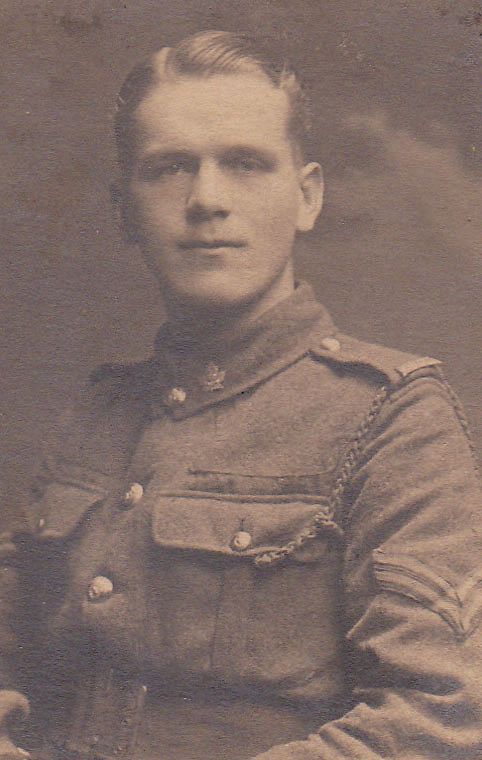
135683 Lt. Arthur Clarke, MC was born in Loughborough, England, in 1895, the youngest of William and Mary Clarke's ten children. His father died when he was five years old.
At the 1901 Census, which was taken shortly after William died, Mary still had eight of the ten children at home. Eighteen months later she re-married and at some point between the 1901 and 1911 Census the family was scattered. At this point Arthur was living with his eldest brother, a policemen in Nottinghamshire. Another of Arthur's brothers, Herbert, had emigrated to Canada in 1904 and returned to visit with a wife and child in 1913, so it is assumed that Arthur joined them some time shortly after this.
Arthur attested in to the 74th OS Battalion of the CEF on July 24th, 1915, aged 20; brother Herbert was given as next of kin and Arthur's peacetime occupation was given as a harp maker.
Posted to France in June 1916, Arthur did not see front line service with 74th Battalion, as it wa sused to supply men to reinforce the Canadian Corps in the field. During the following year he was promoted to Lance Corporal and then Corporal and on 19th May, 1917, he was granted a commission and transferred to the 4th CMR, where he was part of the scouting section on the Headquarters staff.
Arthur appears to have spent much of his time on reconnaissance, leading stealth raids, and on intelligence gathering and reporting. Arthur was awarded the Military Cross. It seems possible that the medal was given as a result of action on 6th March, 1918 (notified to the battalion on 7th June, 1918). On 5th March he led a small patrol into no man's land and whilst it was still dark they came across and pursued a German patrol of one officer and six men. The officer died in the action and one other soldier was captured; he was taken back to HQ for questioning. It was discovered that both the officer and the soldier were wearing the Iron Cross ribbon.
The following evening, March 6th, Lieuts. Clarke and Rutherford and twelve men went out again. They were awaited by a large patrol of the enemy numbering at least 60, who had already begun to encircle them. Led by the two officers, a volley of bombs was thrown and Arthur' patrol dashed to the left, so as to avoid the machine gun fire coming from the centre of the enemy patrol. They managed to break through the enemy line at the weakest spot. On this occasion no prisoners were taken and no one was wounded.
On March 20th, after 32 days in the line, 17 in the front line and 15 in support, the battalion moved into billets at Neuville St Vaast. Arthur was wounded on that day, receiving a penetrating wound to his lower leg, which was described as "slight", but was evacuated to England on 25th March. By May 25th he was declared fit for service but never returned to France. He was posted first to Witely Camp, in Surrey and finally to Kinmel Park in North Wales before embarking for Canada on 20th February 1919.
Both Witely Camp and Kinmel Park appear to have been training camps and at the end of the war, staging posts for Canadian troops awaiting return to Canada. Indeed, a month after Arthur left Kinmel Park the troops there rioted; they were overcrowded, poorly fed and desperate to get home.
In civilian life Arthur became a piano maker, married Ethel Godward in 1920 and lived another 60 years in Toronto.
Biography and image courtesy of Sue Selfe.